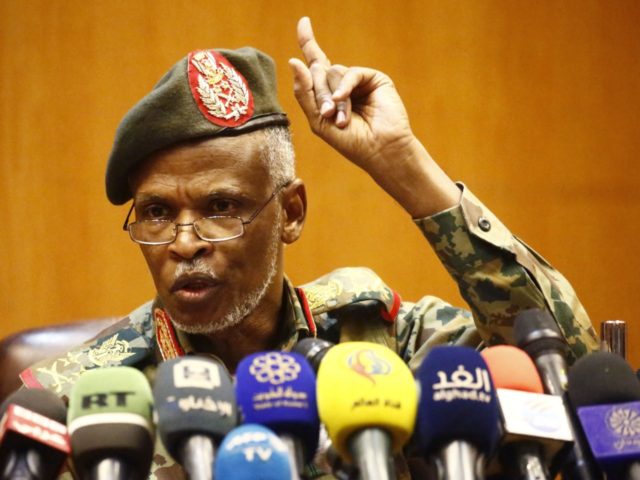Sudanese protesters held a sit-in outside military headquarters in Khartoum over the weekend, demanding the “full dissolution of the deep state” and the prosecution of former regime officials following the ouster of 30-year ruler Omar al-Bashir.
Army troops reportedly attempted to disperse the demonstration but backed down when protesters joined hands, chanted “Freedom!” and “Revolution,” and pleaded with troops to protect them.
The demonstration was organized by the main opposition group, the Sudanese Professionals’ Association (SPA), which urged citizens to “head immediately to the areas of the sit-in to protect your revolution and your accomplishments.” The group camped outside army HQ was slightly smaller than demonstrations at the height of the showdown with Bashir but still thousands strong.
The SPA “completely rejected” a plan by military leaders to rule by junta during a two-year “transitional” period before holding new elections. The demonstrators want the junta to cede power immediately, and they seem to be making progress, as military leaders said on Sunday they are prepared to work with the opposition to establish civilian government.
“The ball is now in the political forces’ court when it comes to the prime minister or a government. If they are ready today to approve anything, we are ready to implement it,” said a spokesman for the transitional council.
The council attempted to organize a meeting of civilian leaders last week, but the SPA said only Bashir loyalists and minor political figures were invited, not prominent opposition leaders or representatives from the SPA’s ranks. The military council pledged to arrange a more inclusive meeting and gave the opposition a week to submit suggestions.
The council also announced the retirement of several key figures with controversial backgrounds, including Defense Minister Awad Ibn Auf, who went on television last week to announce Bashir’s arrest and explain the two-year transition plan. Auf attempted to install himself as interim president but stepped down in a matter of hours.
Also reportedly removed from their posts was intelligence chief Salah Abdallah Mohamed Saleh and Sudan’s ambassadors to the United States and United Nations. The SPA wants former officials of the Bashir regime arrested and put on trial, not merely dismissed from office.
The new leader of the military council, General Abdel Fattah al-Burhan, promised on Sunday to “fight corruption and uproot the regime and its symbols.” He ordered the release of political prisoners and promised regime officials who ordered the use of deadly force against protesters would be brought to justice.
As for Bashir himself, his current location and disposition are unclear. Military leaders have said he is under arrest but ruled out extraditing him to face charges of crimes against humanity at the International Criminal Court. One Sudanese general said on Friday that extraditing Bashir would leave “an ugly mark on Sudan.”
Israel’s Haaretz on Monday suggested one of the key decisions awaiting the new government of Sudan is whether to continue Bashir’s support for the terrorist group Hamas, which he provided with weapons and training.
Under the Bashir regime, Sudan played a key role in feeding guns and explosives to Hamas and, in turn, enjoyed political and religious support from Hamas when he attempted to Islamicize Sudan. In the last years of Bashir’s rule, he apparently saw his interests shifting away from Iran’s terrorist nexus and responded to diplomatic outreach and economic pressure from the U.S. and Israel.
Haaretz took the muted response to Bashir’s ouster from Iran and Hamas as an encouraging sign of apprehension that Sudan will decisively align itself away from Iran and its proxies, and the Muslim Brotherhood, under whatever new government takes shape in the months ahead.

COMMENTS
Please let us know if you're having issues with commenting.